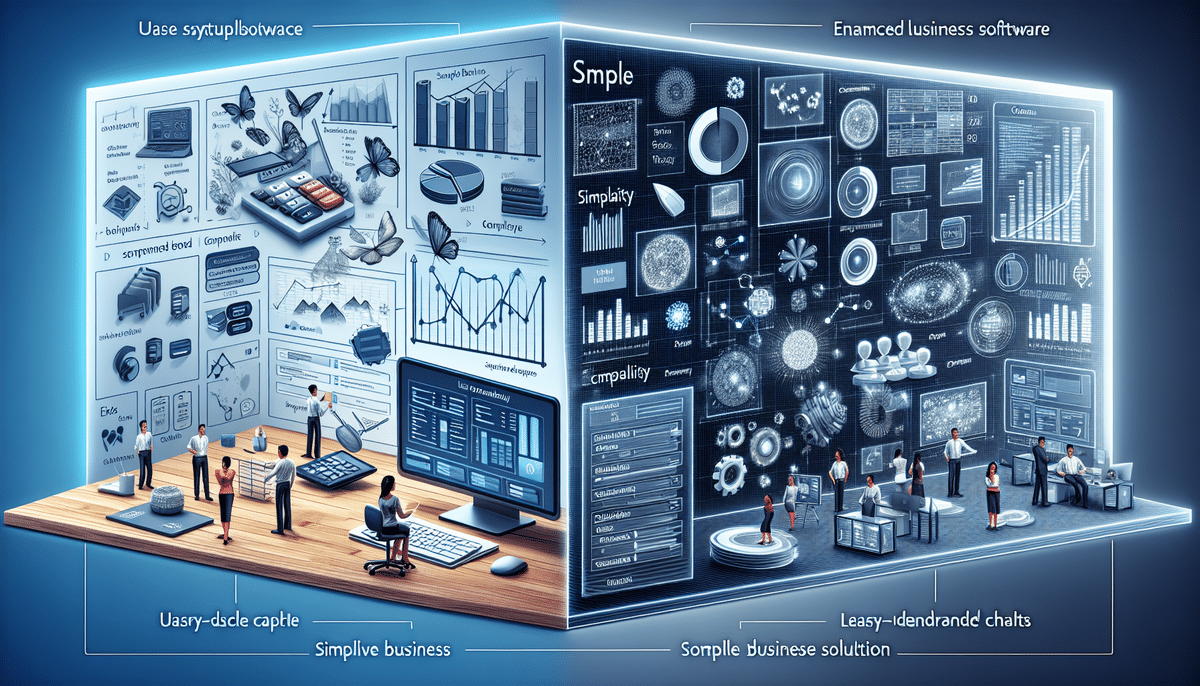FreeAgent vs NetSuite ERP: A Comprehensive Comparison
In today's dynamic business environment, selecting the right software solution is crucial for managing operations efficiently. Two standout options are FreeAgent and NetSuite ERP. This article offers an in-depth comparison of these platforms, aiding you in determining which best suits your business needs.
Introduction to FreeAgent and NetSuite ERP
FreeAgent is a cloud-based accounting software tailored for small businesses and freelancers. Established in 2007, FreeAgent emphasizes simplicity and power, helping users maintain organization and stay on top of their finances.
NetSuite ERP is an enterprise resource planning software designed for medium to large businesses. It offers a comprehensive, integrated suite covering financial management, customer relationship management (CRM), inventory, supply chain management, and more.
Beyond accounting, FreeAgent includes time tracking and project management tools, positioning it as an all-in-one solution for small enterprises. Users can effortlessly track billable hours, generate and send invoices, and manage expenses within a single platform.
NetSuite ERP is renowned for its scalability and flexibility, accommodating complex financial and operational processes. It also provides advanced reporting and analytics capabilities, empowering businesses to gain actionable insights and make data-driven decisions. Both FreeAgent and NetSuite ERP deliver robust solutions tailored to varying business sizes and requirements.
Feature Comparison: FreeAgent vs NetSuite ERP
When evaluating features, FreeAgent and NetSuite ERP exhibit significant differences. FreeAgent offers essential accounting functionalities such as invoicing, expense tracking, and bank reconciliation. However, it lacks advanced features like inventory management and supply chain oversight.
NetSuite ERP delivers an extensive feature set, including:
- Financial Management
- Customer Relationship Management (CRM)
- Human Resources (HR) Management
- Supply Chain Management
- Inventory Management
Designed to manage all facets of business operations, NetSuite ERP handles everything from basic accounting tasks to complex supply chain and manufacturing processes.
Additionally, NetSuite ERP's advanced reporting and analytics empower businesses with deeper operational insights, facilitating informed, data-driven decision-making. This is particularly beneficial for larger organizations with multifaceted operations and multiple departments.
A notable difference between FreeAgent and NetSuite ERP lies in their pricing structures. FreeAgent adopts a simple, subscription-based model with no extra fees for additional users or features. Conversely, NetSuite ERP employs a more intricate pricing model that factors in the size and complexity of a business's operations. While NetSuite ERP may entail higher costs for smaller businesses, it can prove more cost-effective for larger enterprises with intricate needs.
Pricing Comparison: FreeAgent vs NetSuite ERP
Pricing is a critical consideration when choosing between FreeAgent and NetSuite ERP. FreeAgent offers three pricing tiers starting at $10 per month, catering to various small business needs. In contrast, NetSuite ERP provides custom pricing based on individual business requirements, typically resulting in higher costs compared to FreeAgent.
While FreeAgent appears more affordable, it may not encompass all the features and capabilities that NetSuite ERP offers. NetSuite ERP is a comprehensive ERP system designed to manage complex business processes and operations, whereas FreeAgent is more suited to small businesses and freelancers. Therefore, it's essential to evaluate your business's specific needs and budget before deciding between the two.
User Interface Comparison: FreeAgent vs NetSuite ERP
The user interface is a pivotal factor in software selection. FreeAgent boasts a user-friendly, intuitive interface that is easy to navigate, making it an excellent choice for small businesses seeking simplicity and organization.
In contrast, NetSuite ERP's interface can be more complex and potentially overwhelming due to its extensive feature set. New users might find navigation challenging initially.
However, once familiar with the interface, users can leverage its advanced capabilities. NetSuite ERP's interface is highly customizable, allowing users to tailor it to their specific needs, which is advantageous for larger businesses with complex workflows.
Another aspect to consider is automation. FreeAgent provides automated features like automatic bank feeds and invoice reminders, streamlining processes and minimizing errors. NetSuite ERP also offers automation, but its advanced features require a higher level of expertise to implement and utilize effectively. Ultimately, the choice between FreeAgent and NetSuite ERP hinges on the specific needs and preferences of your business.
Ease of Use: FreeAgent vs NetSuite ERP
FreeAgent excels in ease of use, featuring a straightforward design that allows users to begin using the software immediately without extensive training.
NetSuite ERP, on the other hand, can be more challenging, especially for new users unfamiliar with the system. Its steep learning curve requires time and training to master.
Despite the initial difficulty, NetSuite ERP offers more advanced features and customization options once users are acclimated. This can be especially beneficial for businesses with complex accounting needs or those requiring specialized reporting. The final decision between FreeAgent and NetSuite ERP should align with the specific needs and user preferences of your organization.
Customer Support: FreeAgent vs NetSuite ERP
Both FreeAgent and NetSuite ERP prioritize excellent customer support. FreeAgent provides email and phone support, complemented by an extensive knowledge base and community forum where users can find answers and connect with peers.
NetSuite ERP also offers robust support options, including email, phone, and live chat support. However, its knowledge base may not be as extensive as FreeAgent's. Regardless, both platforms ensure users have access to reliable and accessible customer support to address any issues or queries.
Security Features: FreeAgent vs NetSuite ERP
Security is paramount when selecting a software solution. Both FreeAgent and NetSuite ERP offer high-level security features to safeguard your data. NetSuite ERP provides advanced security measures, such as multi-factor authentication and comprehensive encryption, making it ideal for businesses handling sensitive information.
FreeAgent ensures data safety through SSL encryption and regular data backups. While it may not possess the same level of advanced security as NetSuite ERP, FreeAgent still offers a secure platform suitable for small to medium-sized businesses. The appropriate level of security depends on your business's nature and the sensitivity of your data.
Integration Capabilities: FreeAgent vs NetSuite ERP
Integration with third-party applications is essential for a seamless workflow. FreeAgent integrates with popular apps such as PayPal, Stripe, and Shopify, while NetSuite ERP offers integration with enterprise-level applications like Salesforce and Microsoft Dynamics.
Both platforms provide APIs for custom integrations, allowing businesses to connect their accounting and ERP systems with other internal systems like inventory management or CRM software, facilitating a more streamlined workflow tailored to unique business needs.
Best Suited for Small Businesses: FreeAgent
FreeAgent is the optimal choice for small businesses due to its simplicity, affordability, and user-friendly interface. Its pricing plans are budget-friendly, making it accessible for startups and small enterprises.
FreeAgent's features are tailored to small business needs, such as expense tracking, invoicing, and cash flow management, consolidating financial tasks into a single platform. This integration saves time and effort, eliminating the need to manage multiple tools.
Moreover, FreeAgent offers excellent customer support, essential for small business owners who may lack the resources or expertise to troubleshoot technical issues. A dedicated support team ensures reliable assistance, providing peace of mind for small business operations.
Best Suited for Large Enterprises: NetSuite ERP
NetSuite ERP is the preferred solution for large enterprises, offering a comprehensive suite of features and advanced security measures suitable for complex operations.
Its scalability ensures that NetSuite ERP can grow and adapt alongside your business, accommodating rapid growth or shifts in operations seamlessly. Additionally, it provides real-time visibility into business performance, enabling executives to make informed decisions based on accurate data.
NetSuite ERP is a powerful tool for large enterprises aiming to streamline operations and enhance their bottom line through robust, integrated management solutions.
Pros and Cons: FreeAgent
Pros:
- Affordable pricing plans
- User-friendly interface
- Easy to use
- Excellent customer support
Cons:
- Lacks advanced features
- Limited scalability
Pros and Cons: NetSuite ERP
Pros:
- Comprehensive suite of features
- Advanced security features
- Exceptional scalability
- Highly customizable
Cons:
- Higher pricing plans
- Steep learning curve
Case Studies of Companies Using Both Platforms
Numerous businesses have leveraged both FreeAgent and NetSuite ERP to manage their operations effectively. Typically, small businesses and freelancers opt for FreeAgent, while larger enterprises in manufacturing and distribution sectors choose NetSuite ERP.
For example, a freelance graphic designer may use FreeAgent to handle invoicing and expense tracking, benefiting from its simplicity and affordability. In contrast, a large manufacturing company might implement NetSuite ERP to manage its complex supply chain, financials, and CRM, utilizing its comprehensive feature set to streamline operations across multiple departments.
Final Thoughts: Choosing the Best Platform for Your Business
Ultimately, the decision between FreeAgent and NetSuite ERP hinges on your business's specific needs and requirements. If you're a small business seeking an affordable, user-friendly accounting solution, FreeAgent is an excellent choice. Alternatively, if you're a larger company with complex operations that demand a comprehensive, scalable ERP system, NetSuite ERP is the ideal solution.
Both platforms offer robust solutions for managing business operations effectively. Assess your business's size, budget, and operational complexity to determine which platform aligns best with your needs, ensuring you make an informed decision for your enterprise's success.






















